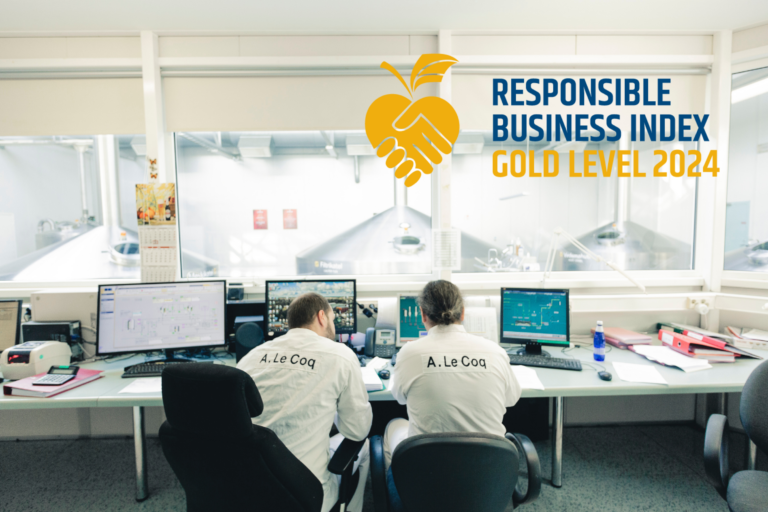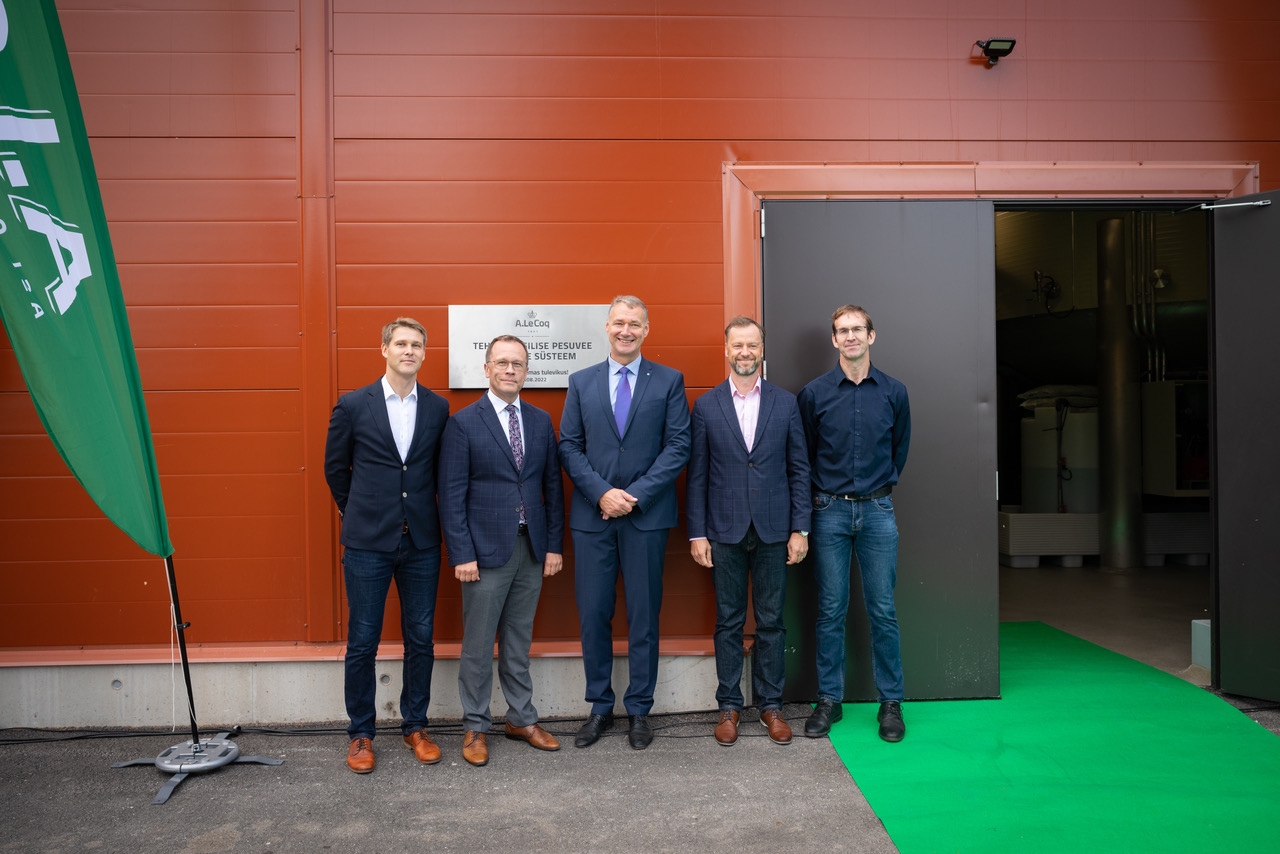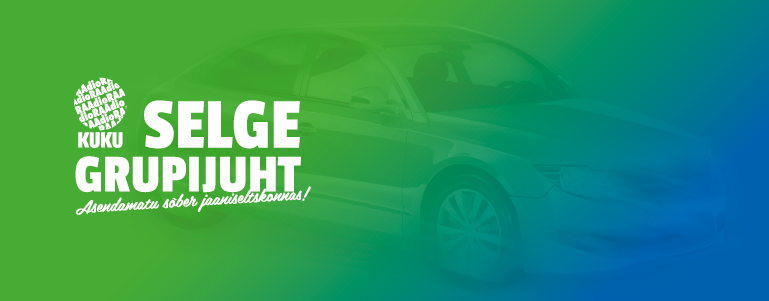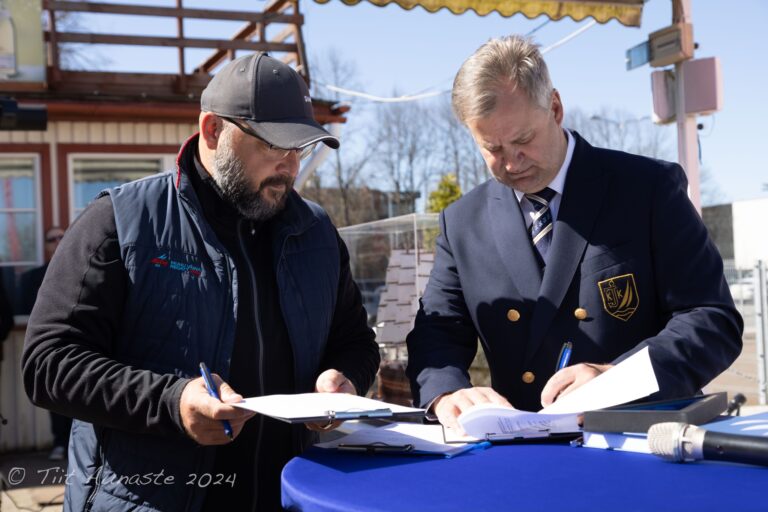

Major Green Investment in A. Le Coq: Own Biogas Production and Reduction of Urban Sewage Pollution Load
Latest news

Today, the A. Le Coq technological wastewater treatment facility was ceremoniously inaugurated, enabling the beverage industry to produce biogas from its wastewater and reduce the pollution load on urban sewage by up to 80%. Alongside the innovative system, a separate sewer system was constructed on the factory premises, allowing the segregation of process water, domestic wastewater, and rainwater into different pipelines.
The total investment cost amounted to 3.5 million euros, with 1.1 million euros sourced from European Union funding. The grand opening was attended not only by A. Le Coq’s CEO but also by Tartu Mayor Urmas Klaas, the Director of the Environmental Investment Centre Andrus Treier, and the CEO of Schöttli Environmental Technology, Tarmo Juhanson.
According to Tarmo Noop, the CEO of A. Le Coq, today marked the completion of the company’s largest environmental investment over the past couple of years, aimed at reducing the company’s environmental footprint. “The newly completed technological wastewater treatment system covers one-tenth of the entire factory’s heat energy needs, significantly reducing natural gas consumption and carbon footprint. In essence, nothing goes to waste in our factory. The system separates solid organic matter from the wastewater generated during production and converts it into biogas, which meets 10-15% of the factory’s heat energy requirements. Given the current energy crisis, the completed building holds even greater significance for us than we initially anticipated,” Noop stated. In addition to biogas production, the system significantly purifies the factory’s wastewater. “As a result, we are able to redirect 80% cleaner water back into the urban sewage system, making it much easier for the Tartu water utility to treat and reuse it,” Noop highlighted another advantage.
The establishment of the technological wastewater treatment system received support amounting to nearly one million euros from the Environmental Investment Centre through the Resource Efficiency Programme. “At the Environmental Investment Centre, we have supported 182 resource-efficient investments by companies, enabling the rapid adoption of innovative technologies. This is essential for both the environment and competitiveness,” said Andrus Treier, Director of the Environmental Investment Centre. “A. Le Coq’s project is undoubtedly an example of changing mindsets. The beverage and food industry, through a sustainable approach, can influence consumers, employees, and the general public to make environmentally friendly choices. This project simply proves that A. Le Coq is genuinely committed to creating a better tomorrow,” added Treier, emphasizing that the Resource Efficiency Support Programme is currently open at the Environmental Investment Centre, welcoming applications from industrial companies.
Tarmo Juhanson, representative of the construction company Schöttli Environmental Technology, which implemented the wastewater system at A. Le Coq, values the company’s mindset of looking beyond its product. “The easiest option is to allow the factory’s wastewater to flow directly into the sewer system without considering its further implications. However, A. Le Coq looks beyond its end product and explores how to valorize the wastewater generated during production to benefit both the company and the environment by turning it into an energy source,” Juhanson said.
The completion of the technological wastewater treatment system is part of A. Le Coq’s commitment to making the world a better and cleaner place to live. One of the company’s key focuses is reducing its carbon footprint, which the newly constructed building helps achieve. The transition to 100% green electricity (in 2020), the installation of a solar park on the logistics center (in 2021), and the implementation of the Energy Track energy management system in production (in 2020) all contribute to reducing A. Le Coq’s annual carbon footprint by over 8,000 tons compared to 2020.
The innovative wastewater system makes the company’s production even more resource-efficient and environmentally friendly. The goal is to replace approximately 184,930 cubic meters of natural gas per year with locally produced biogas and reduce the share of production residues directed to wastewater by up to 80%. The project was co-funded by the European Regional Development Fund, coordinated by the Environmental Investment Centre (EIC). The total project cost amounted to 2,743,712 euros, with the EU contributing 1,135,264.50 euros. Including the establishment of the separate sewer system, the total project cost reaches 3.5 million euros.
Over the past two years, A. Le Coq has invested over 5 million euros in the first phase of its environmental program, with 1.22 million euros received from EU funding. The focus lies in reducing the company’s CO2 footprint, limiting the use of non-renewable resources, contributing to cleaner nature, increasing material recycling, and taking a greater responsibility for human health and well-being. The company has entered a new era where environmental issues and the overall footprint are brought into sharper focus. Starting in 2020, with these initiatives, A. Le Coq promises to leave a better place to future generations.

